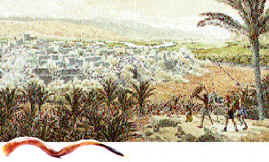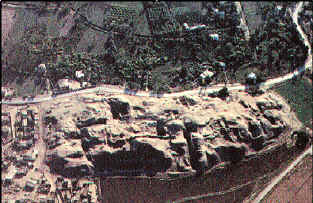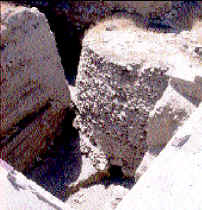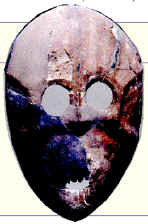The Bible: Joshua: Conflict and Conquest
Joshua as leader: chapter 1
Joshua is one of the Bible’s great books of courage and faith. God told Joshua: “Moses my servant is dead. Now then, you and all these people, get ready to cross the Jordan River into the land I am about to give to them — to the Israelites” (verse 2). The keynote in God’s encouraging address is the repeated call to be strong and courageous (verses 6-7, 9).
| “The Lord said to Joshua… ‘No one will be able to stand up against you all the days of your life. As I was with Moses, so I will be with you; I will never leave you nor forsake you. Be strong and courageous, because you will lead these people to inherit the land I swore to their forefathers to give them” (Joshua 1:1, 5-6). |
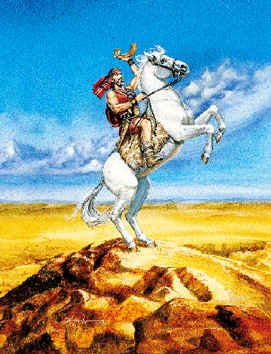 |
| Our illustration shows a triumphant Joshua on horseback holding a shofar. |
| “The true character of Joshua’s leadership can be best appreciated by considering the decided military advantages belonging to his enemies. The Canaanites had experienced armies… chariots… and fortified cities…. Moreover, they were accustomed to forming alliances against a common foe from outside the land…..
“Against these odds Joshua could succeed only by strictly obeying the rules of holy war: complete dependence on Yahweh and strict obedience to His direction. Therefore, he stirred up the faith of his army by ceremony (e.g., [Joshua] 4:1-7), word (10:25), and life (24:15). Furthermore, he demanded of them exact obedience to Yahweh’s word (cf. 8:35; 23:6). “Joshua serves as a model for all of Israel’s future kings: here is a leader possessing Yahweh’s spirit and having prophetic sanction (Nu. 27:18, 22), who is both a military genius and a spiritual giant” (B.K. Waltke, “Joshua,” in The International Standard Bible Encyclopedia, vol. 2, p. 1134). |
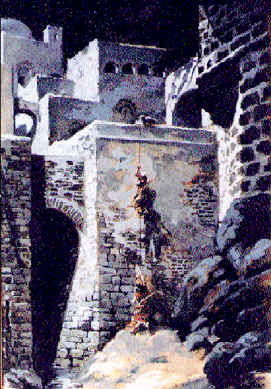 |
| Rahab “let them down by a rope through the window, for the house she lived in was part of the city wall” (Joshua 2:15). |
The basis of Joshua’s confidence and strength was God’s promised presence and power (1:6). But the key to Israel’s success in the Conquest, Joshua’s effective leadership, and God’s saving presence with His people would be Israel’s fidelity to the book of the law. (Thomas L. Constable, “A Theology of Joshua, Judges, and Ruth,” in A Biblical Theology of the Old Testament, ed. Roy B. Zuck, p. 97)
The Israelites promised obedience: “Whatever you have commanded us we will do, and wherever you send us we will go” (verse 16). Sadly, this expression of faith was to prove shallow. Consequently, much of the land was subdued only by toilsome warfare.
The faith of Rahab: chapter 2
Rahab, a prostitute in Jericho, decided to protect the Israelite spies because she recognized the God of Israel as the true God. The Scriptures commend her faith: “By faith the prostitute Rahab, because she welcomed the spies, was not killed with those who were disobedient” (Hebrews 11:31).
Rahab’s faith was well founded (Joshua 2:8-11) and brought her great honor. Through her son Boaz, she became an ancestor of David and of Jesus Christ (Matthew 1:5-6, 16).
The example of Rahab illustrates how God often uses people with simple faith to accomplish his will. It does not matter to God what kind of past they may have had. “Many would assume that Rahab — a pagan, a Canaanite, and a prostitute — would never be interested in God. Yet Rahab was willing to risk everything she had for a God she barely knew. We must not gauge a person’s interest in God by his or her background, life-style, or appearance” (Life Application Bible, NIV, commentary on Joshua 2:8-13).
Crossing the Jordan: chapter 3
It was springtime, and the Jordan River — usually about 100 feet wide — had swollen to a width of roughly a mile and was overflowing its banks. This seasonal flooding was caused by the melting snows on Mt. Hermon feeding the headwaters of the Jordan.
As the priests stepped into the water, God miraculously held back the floodwaters. The Israelites then crossed over, opposite the city of Jericho (verses 15-16; see also Psalm 114:5).
The Promised Land: chapter 4
The Israelites crossed the Jordan on the 10th day of the first month (verse 19). This was the final step in a journey they had begun on the same day 40 years earlier. Then, by selecting the Passover lambs (Exodus 12:2-3), they had made their first response of faith to the God who was leading them to salvation from Egypt. Now, by entering the land God had promised their forefathers — Abraham, Isaac and Jacob — they consummated their covenant with God. To commemorate this event, God commanded the Israelites to build two monuments — one where the priests had stood in the water (Joshua 4:9) and the other at Israel’s campsite at Gilgal (verse 20).
The Israelites now entered a new phase in their relationship with God. Moses had continually exhorted the people to take possession of the land (Deuteronomy 1:21; 3:18; 4:1; 8:1; 11:8, 31). He also delineated their additional responsibilities — under the terms of their covenant with God — once they possessed the land (Deuteronomy 12:10, 29-31; 18:9; 19:1; 27:3). As the Israelites began to possess the land, so these responsibilities outlined in Deuteronomy became incumbent upon them.
The Jordan crossing also resonates historically with the Israelites’ earlier crossing of the Red Sea. Then, God had miraculously allowed the Israelites to escape from Egypt; now, he miraculously enabled them to enter the Promised Land. These experiences of Israel foreshadow Christian baptism (1 Corinthians 10:1-2). Baptism pictures Jesus Christ enabling repentant individuals to escape from the bondage of sin and to enter into a new phase in their relationship with God.
Circumcision renewed: chapter 5
The rite of circumcision, the sign of God’s covenant with Abraham (Genesis 17), had not been practiced during Israel’s 40 years in the wilderness.
Joshua now supervised the circumcision of the males of the new generation at a place they named Gibeath Haaraloth (meaning “hill of foreskins”), which was later renamed Gilgal (Joshua 5:9). This act marked the renewal of the relationship between God and his people.
“The reproach of Egypt” (verse 9) refers to Israel’s national disgrace of enslavement in Egypt and homelessness in the wilderness of Sinai. God “rolled away” this reproach when he had the Israelites circumcised at Gilgal (the name Gilgal is related to the Hebrew word galal, which means “roll” or “roll away”). Israel’s bondage was completely removed. Since circumcision represented a renewal of the covenant, the Israelites were now ready to keep the Passover — the annual festival that commemorated their deliverance by God from slavery in Egypt (verse 10).
The fall of Jericho: chapter 6
Israel conquered the walled city of Jericho by faith and obedience to God, not through human wisdom and power. While God explained to Joshua what would happen (verse 5), the account does not tell us that God told the Israelites why he was having them march around the city for seven days. Humanly speaking, it may have appeared to be an exercise in futility. In fact, it was not until the seventh day that Joshua exhorted the people: “Shout! For the Lord has given you the city!” (verse 16).
Achan’s sin: chapters 7-8
After they conquered the city of Jericho, the Israelites had a route into Canaan. However, the central highlands were still protected by the strategic city-fortress of Ai. The Israelites attacked the city, but were put to flight by the men of Ai, who killed about 36 Israelite soldiers (Joshua 7:4-7). God revealed to Joshua the reason for this humiliating defeat (verses 10-11). When confronted, Achan confessed his guilt (verses 20-21).
Achan had exercised the fighting-man’s right, in the ancient world, to plunder the ruins of a conquered city, something that God did allow the Israelites to do in subsequent military campaigns. However, God had specifically pronounced everything in the first Canaanite city to be conquered, Jericho, as “devoted to the Lord” (Hebrew: cherem, meaning “something consecrated for destruction by God”). To plunder the city was to steal from God.
Achan’s sin illustrates how the actions of a single person can affect the family and the nation. The sin of the individual does affect other people. There are no victimless crimes, no private sins. Knowledge of sin may be kept secret, but the impact of sin is widespread. All of us need to be reminded of this from time to time. It is good to consider how devastating the sin of one person can be to the well-being of a family, church, business or other social group.
Following Achan’s execution, God again directed Israel to attack Ai, this time by way of ambush (Joshua 8:1-8). God commanded Joshua to stretch out his javelin toward the city until all its inhabitants were destroyed (verses 18, 26). This act brings to mind Moses’ uplifted hands in the victory over the Amalekites (Exodus 17:11-13).
Note that although the city of Ai, its king and its people were consecrated by God for destruction, the plunder and livestock were not (Joshua 8:2, 27).
Joshua knew that Israelite swords and spears had not won the battle. The God of Israel had conquered Ai. The psalmist would later echo this truth in a song of praise to God: “It was not by their sword that they won the land, nor did their arm bring them victory; it was your right hand, your arm, and the light of your face, for you loved them” (Psalm 44:3).
For the Christian, the lesson of Ai is clear: We can triumph where, in the past, we have failed — if we rely on God (Proverbs 24:16; Ephesians 6:10-18). However, we must first repent of our sins and respond to God’s correction.
After the conquest of Ai, Joshua led the Israelites in reconfirming their covenant with God by performing the ceremony of blessings and curses as prescribed by Moses (Joshua 8:30-35; see also Deuteronomy 27–28).
Gibeon tricks Israel: chapter 9
Gibeon was a strategically important city about 5 miles northwest of Jerusalem. Its inhabitants, the Hivites, resorted to trickery, pretending to have come “from a distant country” (verse 6).
Their pretense of friendship deceived the leaders of Israel, who then made a treaty with them. For Israel, it was a fundamental mistake because they “did not inquire of the Lord” (verse 14).
Too late, the Israelites discovered that the Gibeonites lived in the Promised Land. But Israel’s vow was not nullified by the Gibeonites’ trickery. For this deceptive act, however, Gibeon was put under a curse (verse 23).
Joshua’s long day: chapter 10
The name Adoni-Zedek occurs in connection with the first mention of Jerusalem in the Bible (verse 1). He was the head of a coalition that decided to attack the Gibeonites because of their treaty with Israel. Due to the obligations of the treaty, Joshua came to Gibeon’s rescue.
In one of the most remarkable battles in Israel’s history, all five Amorite kings were executed and their armies decimated (verses 16-28). Joshua’s army then went on to conquer all the strategic cities of the south (verses 29-43).
God used nature to aid Israel in this victory (verses 12-14). Some scholars believe that Joshua’s “long day” was caused by a miraculous slowing of the earth’s normal rotation. Others conclude that some unusual refraction of the sun’s rays produced additional hours of light. We do not know exactly how God did it, but we do know that he performed a miracle. Miracles do not depend upon scientific explanation.
The northern campaign: Chapters 11 – 12
The northern conquest: Chapter 11
Jaban, king of Hazor, formed a northern confederacy. Although it was more powerful than the southern alliance, it met with no greater success.
Following God’s instructions, Joshua hamstrung the enemy horses and burned their chariots (verses 6, 9) so that Israel would continue to trust in the Lord and not in captured implements of war. Hazor, the capital of the territory, was destroyed by fire.
The defeated kings: chapter 12
Verses 1-6 review the Israelite conquests in Transjordan during the time of Moses, “from the Arnon Gorge to Mount Hermon, including all the eastern side of the Arabah” (verse 1). The roster of 31 conquered kings in verses 7-24 identifies those defeated during the time of Joshua.
Division of the Land: chapters 13 – 24
Transjordan: chapter 13
Verses 1-7 introduce the next section of the book — possessing the land. Israel had been a homeless people for 40 years. Now God was giving them their inheritance.
God told Joshua, “You are very old, and there are still very large areas of land to be taken over” (verse 1). In several places, the Israelites — for lack of faith — could not drive out local populations. Jerusalem was a case in point: “Judah could not dislodge the Jebusites, who were living in Jerusalem; to this day the Jebusites live there with the people of Judah” (Joshua 15:63).
The rest of Joshua 13 discusses the land east of the Jordan (verses 8-14), the tribe of Reuben (verses 15-23), the tribe of Gad (verses 24-28) and the half-tribe of Manasseh (verses 29-33).
Caleb’s request: chapter 14
Joshua, Eleazar and the tribal chieftains distributed the land by lot (verses 1-5; Numbers 26:55; 33:54; 34:13). The ever-faithful Caleb requested the territory of Hebron. Although the city of Hebron later became Levitical property (Joshua 21:9-13), Caleb kept the fields and villages around the city.
The tribe of Judah: chapter 15
Judah’s large allotment included the land already granted to Caleb (verse 13), as well as a part of Jerusalem (verses 8, 63; Joshua 18:28). The size of Judah’s territory reflected the tribe’s traditional leadership role. It included much of the southern desert.
The tribe of Ephraim: chapter 16
The general borders of the land given to the sons of Joseph stretched northwest from Gilgal. Although Joseph was one of Jacob’s sons, he did not have a tribe named after him. Instead, as the oldest son of Jacob’s wife Rachel, Joseph received a double portion of the inheritance.
This double portion was given to Joseph’s two sons, Ephraim and Manasseh, whom Jacob considered his own (Genesis 48:5). The largest territory and the greatest influence in the northern half of Israel belonged to their tribes. The Ephraimites received some of the best land (Joshua 16:1-4), but failed to conquer all of it. For example, they could not expel the Canaanites from Gezer (verse 10), a strategically important city 18 miles northwest of Jerusalem.
Earlier, Joshua had defeated the king of Gezer (Joshua 12:12), but the Canaanites recaptured the city. It remained under Canaanite control until the time of Solomon (1 Kings 9:16).
Ephraim failed to drive out all of the Canaanites, just as Judah had failed to drive out the Jebusites (Joshua 15:63). Moses had warned that such failure would eventually turn the Israelites from following God (Deuteronomy 7:1-5).
The tribe of Manasseh: chapter 17
Articles in “Exploring the Word of God: Historical Books”
|
Manasseh was given more land than any other tribe. In addition to its territory east of the Jordan, it controlled the northern part of the central hill country up to the Valley of Jezreel.
Ephraim and Manasseh’s complaint and plea of weakness (verses 14-18) showed a lack of faith. They looked at the power of the Canaanites’ iron chariots in the Valley of Jezreel instead of the power of God. In contrast, Joshua’s courageous answer (verses 15, 17-18) demonstrated his faith in the promise God had given him earlier (Joshua 1:5-6).
The other tribes: chapters 18-19
Seven tribes had still not claimed their allotted territory (Joshua 18:2). Joshua responded to their lack of faith by urging them to explore the land and claim their possession.
The remainder of Joshua 18 and 19 describes the territorial boundaries of these seven tribes as follows: Benjamin (Joshua 18:11-28), Simeon (Joshua 19:1-9), Zebulun (verses 10-16), Issachar (verses 17-23), Asher (verses 24-31), Naphtali (verses 32-39) and Dan (verses 40-48).
The cities of refuge: chapter 20
Six designated cities provided refuge for those who had committed unintentional homicide (see Numbers 35:9-28 and Deuteronomy 19:1-13). Specifically, these cities gave protection from the “avenger of blood” (Joshua 20:3-5), the deceased person’s nearest relative who was permitted to avenge the death.
Levitical cities: chapter 21
God was the special inheritance of the Levites. Thus, the Levites were prohibited from owning rural land like the other tribes. (Compare Deuteronomy 10:9, Joshua 13:14, 33 and 14:3-4.) The three Levitical families — the Kohathites (Joshua 21:9-26), the Gershonites (verses 27-33) and the Merarites (verses 34-40) — were given 48 cities throughout the land, ensuring that the religious leaders were dispersed among the tribes. This distribution also fortified the worship of the true God against regional idolatry.
Return to Transjordan: chapter 22
Reuben, Gad and the half-tribe of Manasseh returned home to their own lands east of the Jordan (see Numbers 32:20-22 and Joshua 1:12-18). Joshua thanked them for their faithful role in the conquest (Joshua 22:1-6).
As they left, however, a misunderstanding caused a national controversy. The departing tribes built what appeared to be an altar on the frontier just west of the Jordan River (verses 10-12). The other tribes perceived this as a blatant violation of God’s law, which permitted only one sanctuary (Deuteronomy 12:13-14). As it turned out, the “altar” was not to be used for burnt offerings and sacrifices, but rather as a memorial or witness (Joshua 22:21-29, 34). It testified that the 12 tribes, although separated by the Jordan River, were one people under God.
Joshua’s farewell: chapters 23-24
Joshua’s farewell speeches are comparable with those of Moses (Deuteronomy 31–33). Having reached the end of his long life, Joshua reminded the Israelites of God’s goodness and faithfulness. He encouraged them to continue to obey God, and warned them of the dangers of idolatry and apostasy.
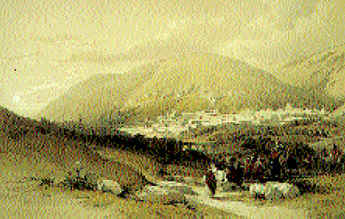 |
| The city of Shechem was about 41 miles north of Jerusalem in the pass between Mt. Ebal and Mt. Gerizim. It dominated an important trade route and controlled a fertile valley to the east where Jacob’s sons had pastured their flocks (Genesis 37:12-14). When the Israelites entered Canaan, Shechem passed peacefully into their hands. It became the earliest religious center of the tribes and was also a Levitical city of refuge (Joshua 20:7). While at Shechem, Joshua renewed the Sinai covenant with Israel’s tribal leaders at “the holy place of the Lord” (Joshua 24:25-26). |
At Shechem, Joshua reviewed the history of the children of Israel from the time of Abraham to the time of the conquest (Joshua 24:1-13). Once again, he challenged the people to serve God only (verses 14-15).
Throughout his lifetime, this great spiritual leader and military commander had remained wholly committed to God. The Israelites’ enthusiasm in renewing their covenant with God (verses 16-18) was a fitting tribute to Joshua’s leadership. “And the people said to Joshua, ‘We will serve the Lord our God and obey him’” (verse 24). Indeed, verse 31 shows the power of Joshua’s spiritual influence: “Israel served the Lord throughout the lifetime of Joshua and of the elders who outlived him.” Joshua had been a living example of God’s way of life, and he wanted that to be his legacy.
For what do you wish to be remembered, and what do you want to pass on to your family and friends? A Christian can leave nothing better than the mandate to love and obey God, and the memory of someone who did so.


